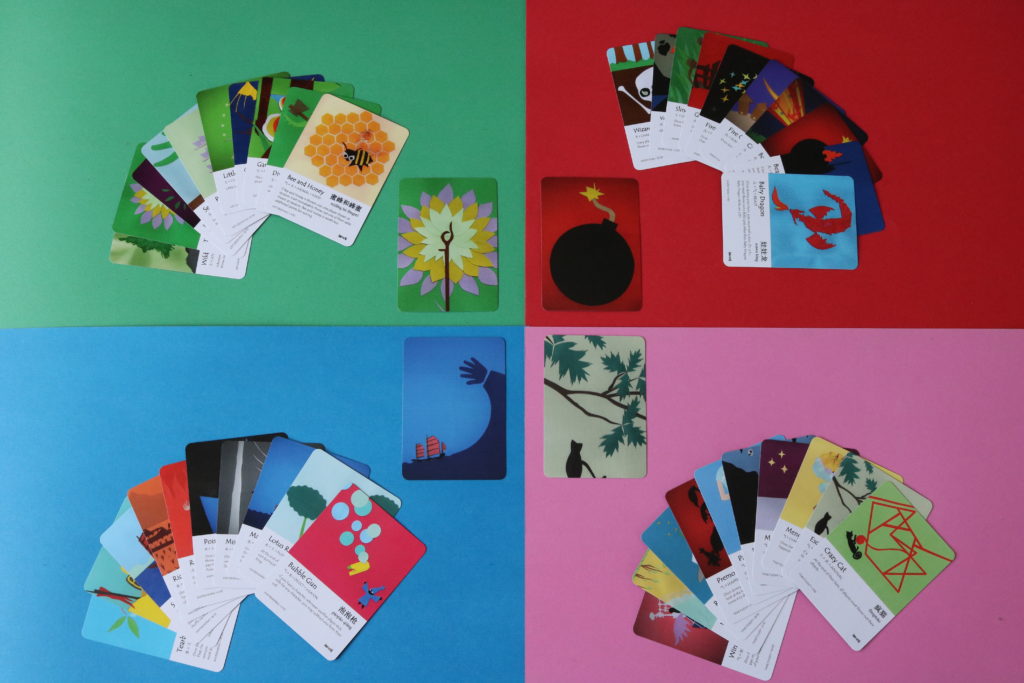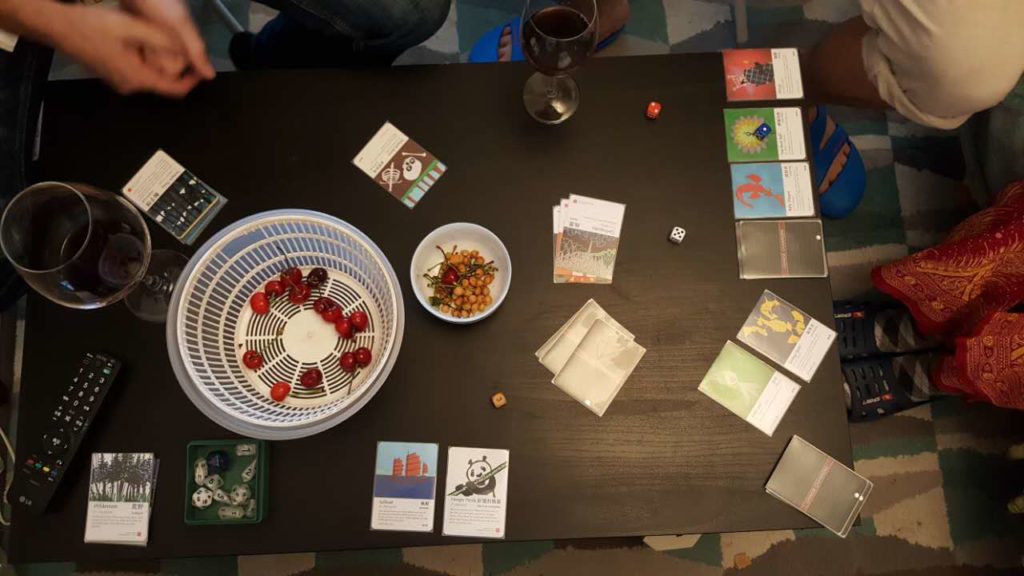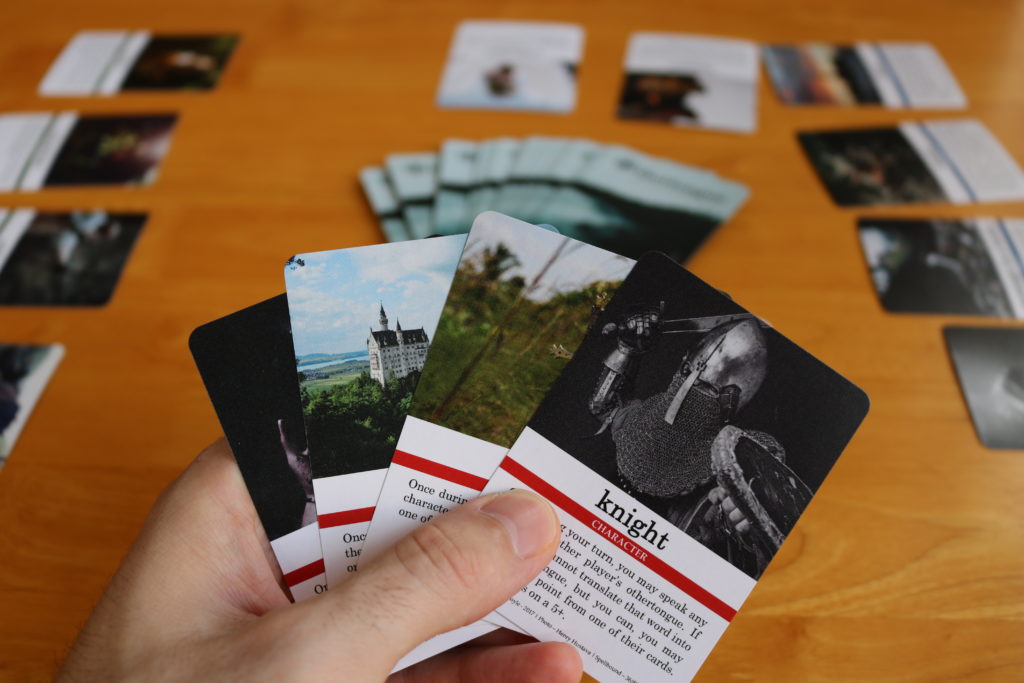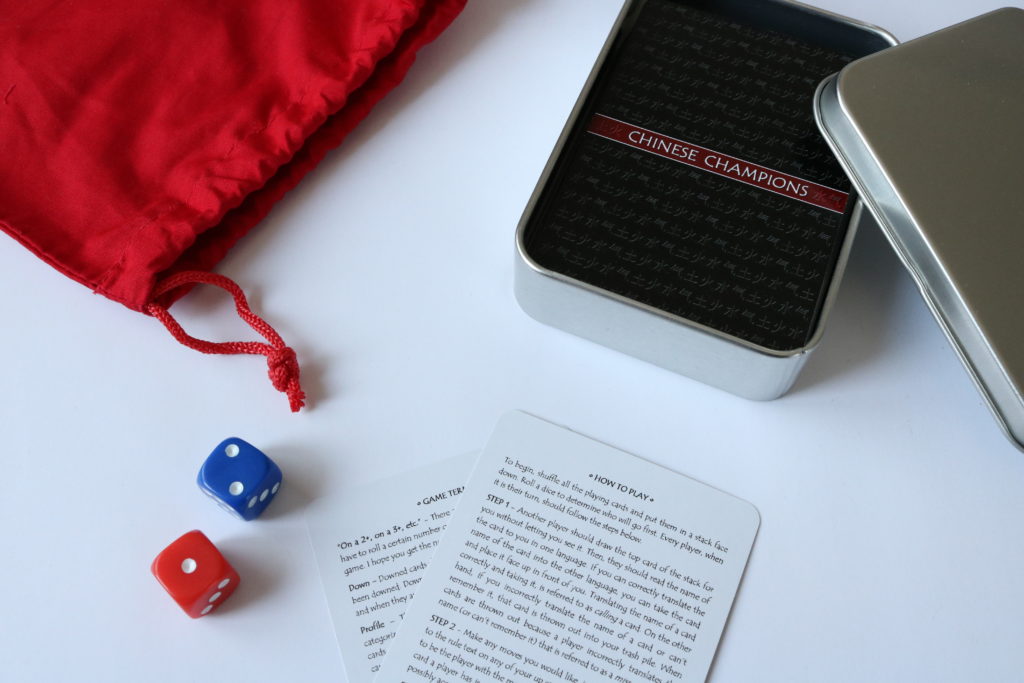Introduction
As a student, teacher, and card player, I know that language card games are an invaluable resource for learning languages. The simple fact is: if you can play cards, you can learn languages.
In this article, I put my top ten reasons for using language card games on the table!
Gamification – 01
Perhaps the greatest advantage of using language card games is that they align with many people’s natural inclination to learn through play. They gamify boring, systematized learning processes by their use of strategy, levels, random chance, teamwork, and competition. In addition to that, the cards themselves can be collected, traded, compared, organized, and appreciated.
How many people do you think gave up learning a language simply because:
- they couldn’t find an inviting way to start?
- it was boring or intimidating?
- it was done largely in isolation?
- or there were too many teachers, textbooks, and tests?
Great news: language card games can assist us in overcoming all these problems. They are entertaining and involve groups of friends with similar goals!
Personally speaking, I know that part of the reason I started using an SRS flashcard box (and later created Chinese Champions) was that I had to make a game out of building my Chinese vocabulary. I wanted to make a monotonous process more fun and diversify to the vocabulary I knew.
But I’m not the only one who thinks this way. An American teacher contacted me for a sample of Chinese Champions Card Game, saying, “I teach 12-18 year old students at an all-boys school. Being an all-boys school, gamification is key.”
Chinese Champions Card Game by Matthew Boyle
Language Card Games Promote Social Learning – 02
Just as it is true that many people love to learn through play, many people also love to learn in social groups. Indeed, education researchers tell us that social learning is the most powerful form of learning. Well, language card games certainly unlock that power!
Whereas textbooks and classes often divide learners based on their language proficiency, language card games often include everyone, encourage discussion, and allow for tangentially related conversation. Othertongue, for example, actually requires players to use their diverse background knowledge of different languages and cultures to compete, cooperate, and teach each other. This enriches the game immeasurably.
In a typical language card game, everyone will have the opportunity to learn from each other and also to fulfill different roles, such as: shuffler, dealer, rule-explainer, mediator, and judge. Other universal values like good sportsmanship, fairness, honesty, and strategic thinking, will simultaneously be impressed upon players. In this social environment, it doesn’t take long to realize that the conversations which happen around the table become as important, or more important, than the game itself.
A rousing game of Chinese Champions!
Hands-on – 03
While a large majority of people learn well through games and social activities, an equally significant number prefer to learn through their hands. And it’s not simply that they enjoy the sensation of objects, but that they actually create meaning from manipulating, ordering, arranging, comparing, and discussing them. Furthermore, hands-on activities like card games help them to focus for longer periods of time, developing their patience and concentration.
Make no mistake, for some people, shuffling, dealing, holding, placing, and ordering cards to learn a language, is a very attractive proposition. In fact, the creator of Japanese: The Game once stated that he was inspired by a student who was having trouble understanding Japanese sentence construction and grammar. A prototype of the card game was made and they discovered that the student learned much better when he could see and arrange the cards to understand.
This need to have a hands-on way to learn language is definitely true for me as well. Again, it’s why I started using a physical SRS flashcard box and creating language card games in the first place.
Othertongue by Matthew Boyle
Visual Impact – 04
If we are to discuss the best way to remember languages, we would be remiss to leave out the visual dimension. It is well documented that the human mind remembers languages better when provided strong visuals. Gabriel Wyner, a polyglot, advised readers to include a picture on every flashcard that they made in his book Fluent Forever. It turns out, being able to link a new vocabulary word with an image, imprints that word upon our minds much more deeply.
And this is where the creativity of the language card game designer really comes into play. When attempting to determine just how much visual oomph a designer can pour into a language card game, the sky’s the limit! I believe language card designers are visionaries who will continue to imprint our minds with their memorable designs.
As for me, I try to weave a lot of colors and stories into the artwork of Chinese Champions. This led one customer named Cirma to say, “Can’t wait to play and learn more characters. The illustrations are so good.”
Adaptable – 05
Another fantastic advantage of language card games is their versatility. They can often be used in many ways beyond what is explicitly stated in their rules.
Language card games can be used to:
- preview new concepts and vocabulary or review old ones
- play games like Concentration
- study like flashcards
- or fill an SRS box
I, myself, have posted a video showing some simple warm-up games people can do with Chinese Champions before they actually play the real game. (You might be able to refer to that video for whatever language card game you have, too.)
Some language card decks are even specifically designed to be used in many different ways. The games produced by Kloo, Smart Canary, and Aiya! are great examples of that. But regardless of whether a single game is designed to be used in multiple ways or not, I expect that imaginative players will never be at a loss for how to use their cards in a variety of ways to maximize the benefits!
Compatible with Spaced Repetition Systems and Philosophy – 06
In the last section on adaptability, I mentioned that some card games might be used to fill an SRS box. But I actually think that playing language card games is itself an embodiment of SRS philosophy.
Think about it: because it is unlikely you will play the same language card game every single day and because it is unlikely that you will see the same card every time you play a given game, your memory of the languages on the cards will be tested at irregular intervals. That is something quite like an SRS system!
I suggest we could take this a step further still, and conscientiously employ SRS philosophy to decide which language card games we play and when. For some, this might take too much fun and spontaneity out of the whole thing, but for others (especially hardcore gamers with many language card games in their rotation) it might be something worth trying. Perhaps in this way we can increase the retention of information and make progress more efficiently.
Imaginative – 07
Language card game designers like me want to fire the imagination and curiosity of language learners everywhere. We want to show that languages are alive, growing, and changing, and that card games are up to the task of capturing our greatest flights of fancy and even our dreams! Textbooks and classes, by contrast, approach languages in systematic way, which makes it hard or impossible to show the artistic, creative, and ever-changing side of languages.
And it is precisely those aspects of language, rarely addressed in a traditional approach, that language card game designers have full license and freedom to convey to us! Thus, by incorporating language card games into our study routines, our imagination will be fed. That will balance out all the spiritless textbooks and classes, which are somewhat of a necessary evil for many of us (at least while learning the basics).
Portable – 08
Language card games are convenient to store, transport, and break out on the fly. As a result, they encourage you to continue learning languages any time, any place, while traveling, or on vacation. It will be easy for family, friends, or strangers to join you in a quick game, to learn from you, or to teach you something. Undoubtedly, an important reason behind the allure and usefulness of a language card game is its portability.
Good language card games come in small packages!
Low Cost – 09
An average language card game deck usually doesn’t cost more than a new textbook or a single tutoring session, yet think of how many hours of enjoyment you will get out of it! Assuming you protect your cards with plastic sleeves and a deck box, they will be around for many, many years to come, providing you with ever-expanding learning opportunities along the way. A worthy return on your investment, wouldn’t you say?
Consider this: language card game designers often:
- host giveaway contests
- offer free or reduced-price samples of their games (for example, to teachers)
- offer limited-time discounts (seasons, holidays, anniversaries, etc.)
- and pass on savings and unique rewards to their followers through crowdfunding campaigns
Language Card Games Maintain Your Interest – 10
Learning a language requires time and dedication. There will inevitably be periods where our gains plateau or our interest wanes, just like an athlete. After reading this post, it should be obvious how language card games enable us to triumph over those types of challenges. They do so largely by maintaining and stimulating our interest.
Whenever we feel a lull in our practice, whenever we feel like traditional methods just aren’t doing the trick, we can rely a little more on language card games to get us through. They can restore our enthusiasm; make use of spare moments, lazy afternoons, or rainy days; connect us to new people; and teach us exciting words and concepts that aren’t readily found anywhere else.
Promote Indigenous And Endangered Languages – 11
Amazing people all over the world use language card games to teach, protect, and grow their mothertongues, which might be endangered. Card games are a simple and fun way for elders to share their language with young children, for example. Check out what these incredible ladies are doing to advance their language, Cocopah, here.
Some language card games that promote indigenous languages: Winambuu (Gamilaraay); Potlatch (Lushootseed); Zentetl: A Nawatl Language Card Game (Nahuatl/Aztec); osihtātān itwēwina A Word Making Card Game of nēhiyawēwin, the Cree Language (Cree); and Tigrigna Words Playing Cards (Tigrigna). Have you found any others? Let us know!
Improve Our Health – 12
Language card games give us a compelling reason to go screenless!
The American Heart Association advises parents to reduce their children’s screen time in order to protect their hearts… literally. After reviewing 20 years of research, they found an overall net increase in the amount of time children and teens spend in front of a screen, which has huge implications for obesity, high blood pressure, and high cholesterol. I’ll post a link to that article here.
Not only that, but screens put out intense amounts of blue light, which block up to 80% of our melatonin from coming out when it is time for us to get sleepy! It may take hours for our melatonin to come out after finally turning off the screen. This prevents us from getting deep, healing sleep at night. For more on this, I recommend you check out Shawn Stevenson’s work here.
Technology also does a bad job of parenting, so we shouldn’t leave the responsibility to it. The dangers of YouTube autoplay, just to name one example, were made abudantly clear by James Bridle here on July 13, 2018. When children (and us, too, for that matter!) are on smartphones, tablets, and computers, it is easy for autoplay to take them to very dark places, very quickly, or for them to navigate away to innappropriate content themselves with one simple swipe.
Language card games encourage us to get back to a healthy, happy, sociable lifestyle with friends. With laughter, learning, and strategizing around a table, there’s no telling how many benefits we can reap for our mind, body, and soul. And now, with a greater variety of language card games on the market than ever before, it’s easy for people of all ages and skill levels to join in the fun!
Conclusion
As you can see, the benefits of language card games abound! Not only do they diversify our standard, go-to methods for learning languages, but they also round us out in terms of our overall aptitudes for critical thinking, good sportsmanship, and group communication. Though I would argue we all stand to gain something by playing language card games, perhaps people who prefer to learn in small, social groups, with visually-stunning materials they can also touch, have the greatest potential to excel with this way.
So what’s your take on language card games? Can you think of any other advantages that I didn’t mention? Why do you like to play language card games? I welcome you to post your thoughts in the comments section below. And, if you enjoyed reading this article, feel free to share it with other people who might be interested!
Want to be alerted when I finish a new blog post? Just subscribe in the footer of this page to receive occasional e-mail updates from me.
This Post Has 5 Comments
Leave a Reply
You must be logged in to post a comment.




Do you have a card game for learning Spanish?? I’d be interested in that!!
Othertongue can be used to review and improve vocabulary in any target language, so you could potentially use that! But I don’t have a game solely for Spanish at this time. I might recommend the game Digame to you, though. Thanks for taking the time to leave a comment!
This is a great way to study language.
Thank you for a great product!
I’m so happy to read this. This is the kind of manual that needs to be given and not the accidental misinformation that is at the other blogs. Appreciate your sharing this greatest doc.
Thank you, Eve! You are always so supportive of my blog. Please tell me what I can do to turn you into my next happy customer! I’d love to make that happen!